The eighth week of pregnancy is a time of great changes: the embryo continues to form its organs and, in addition, the placenta acquires its full functionality to begin to nourish the embryo.
On the other hand, the woman may notice that her belly has grown a little or feel tight clothing at 8 weeks, although this is not evident in all cases.
Provided below is an index with the 7 points we are going to expand on in this article.
- 1.
- 1.1.
- 1.2.
- 2.
- 3.
- 4.
- 4.1.
- 4.2.
- 4.3.
- 4.4.
- 4.5.
- 5.
- 6.
- 7.
The embryo at 8 weeks
In the eighth week of pregnancy, the embryo continues to grow rapidly. Its head is much larger than the rest of the body, which is already beginning to elongate and take the shape of the future baby.
The embryo's facial features are already more evident: the nose and upper lip are formed, the ears begin to take their shape and the eyes are covered with the skin that will form the eyelids. The size of the embryo at 8 weeks of pregnancy is about 13-18 millimeters and can weigh about 3 grams.
A very important change that occurs in the eighth week is the formation of the skin of the embryo, which is translucent and reveals the skeleton, still formed by soft cartilage.
The heart already has four chambers, the aortic and pulmonary valves are differentiated, and the blood is pumped very strongly and rapidly, about 180 beats per minute.
In week 8 of pregnancy, it is also possible to see how the embryo's arms and legs have elongated and it is possible to distinguish the hands and feet. In addition, the fingers begin to form, although they remain attached by membranes, and the elbows are already visible.
As for the brain, it is not yet fully formed, but it is attached to the spinal cord and neural pathways are appearing.
Functionality of the placenta
At week eight of pregnancy, the embryonic placenta is already implanted in the uterus and will continue to grow in the coming weeks.
Until now, the feeding of the embryo has depended on its vitelline vesicle, an embryonic structure that disappears. The embryo has grown a lot in the last few weeks and its nutritional requirements have increased.
Therefore, the placenta assumes the function of nourishing the future fetus through the umbilical cord from this moment on. Thus, the embryo receives the nutrients and oxygen necessary for its development from the maternal blood.
The first ultrasound
Once a woman finds out she is pregnant with a positive pregnancy test, the first visit to the gynecologist is usually scheduled for approximately week 8.
In this week, it is already possible to see the embryo in a first ultrasound, take its measurements and listen to the heartbeat. This confirms the gestational age of the embryo and checks if the pregnancy is developing normally.
If the embryo or gestational sac is not seen in this first 8-week ultrasound, it could be an anembryonic pregnancy or ectopic pregnancy, respectively, which means that the gestation will end in miscarriage.
The gynecologist will also take the first measurements of the mother's weight and blood pressure to monitor throughout the pregnancy.
After this first visit, subsequent ultrasounds are usually scheduled every 4-6 weeks, unless a problem arises during gestation.
Symptoms in the mother
In the eighth week of pregnancy, an important change occurs in the body of the expectant mother: the uterus begins to grow. This is not yet very evident to the woman because the belly has not yet swollen.
However, it is possible to feel discomfort due to the enlargement of the uterus, such as pins and needles and cramps in the belly and legs. Some women even feel sciatic pain as a result of the pressure exerted by the uterus on this nerve.
The woman may also continue to experience the typical pregnancy symptoms that have accompanied her for the previous weeks, although these may gradually disappear. These are discussed below:
- Nausea.
- Heartburn
- Constipation.
- Aversion to smells and tastes
- Mood swings
- Fatigue and headache
- Breast augmentation
- Cravings
Some of these symptoms are related to the hormonal changes that the woman has undergone in recent weeks and all are completely normal.
Recommendations in week 8
As pregnancy progresses, a woman must pay more attention to the care her body needs, not only to combat the most bothersome symptoms but also to promote the healthy development of her future baby.
To this end, we are going to discuss some very useful tips that should be followed throughout your pregnancy:
- Nutrition
- the most important nutrients for pregnant women are folic acid, iron, calcium, iodine, zinc, vitamin D and omega-3 fatty acids. It is also very important not to skip meals and to drink plenty of water throughout the day.
- Cleaning habits
- it is very important to wash hands and utensils thoroughly before preparing food, as well as to clean fruits and vegetables before consumption. In addition, it will be necessary to cook meat and fish well, and avoid raw foods so that there is no risk of toxoplasmosis or listerosis.
- Harmful substances
- toxic habits such as smoking, coffee, and alcohol must be eliminated from daily life, especially now that the baby's nourishment depends on maternal blood and placenta.
- Physical activity
- moderate exercise is very important for maintaining a healthy pregnancy, as it helps combat fatigue and other symptoms, provides energy and strength for childbirth, and helps maintain proper weight. The most recommended sports for pregnant women are yoga, pilates, swimming, or daily walking.
If you want more detailed information about the necessary care during pregnancy, we recommend you to visit the following article: Health in pregnancy.
FAQs from users
When should the first ultrasound of pregnancy be performed?
According to the SEGO (Spanish Society of Gynecology and Obstetrics) along with other gynecological societies worldwide, the first regulated or official ultrasound of pregnancy should be done between 12 and 14 weeks, at which time the correct dating of the pregnancy is performed, to see if the growth that is observed in the ultrasound coincides with that which marks the date of the last menstrual period. In addition, a first study of fetal morphology is performed and very important ultrasound markers such as the nuchal fold are measured, which combined with other analytical tests (PAPPA and BHCG) allow estimating the statistical risk of genetic disease such as Down Syndrome or Edwards' Syndrome.
What if I have bleeding in week 8 of pregnancy?
Some women may have a pinkish discharge or light bleeding during pregnancy that does not necessarily indicate anything is wrong. However, if this occurs frequently or if the bleeding is heavier, it is best to see your doctor to make sure everything is okay.
Heavy bleeding in pregnancy may be caused by intrauterine hematomas, which could be a threat of miscarriage.
Why am I 8 weeks pregnant if the fetus is only 6 weeks?
The weeks of pregnancy are counted from the woman's last menstrual period. Therefore, they do not correspond to the gestational weeks of the embryo. Normally, when the woman is 8 weeks pregnant, the embryo is 6 weeks gestational.
What month does week 8 of pregnancy correspond to?
The eighth week is the last week of the second month of gestation. Therefore, at 8 weeks pregnant, a woman is exactly 2 months pregnant.
Is it possible to travel or fly by plane in week 8 of pregnancy?
Yes, in principle, there is no problem in taking a trip, whether by car, train or plane, at this stage of pregnancy.
Women who decide to go sightseeing during their pregnancy should be careful to stay well hydrated and take as many breaks as necessary to avoid fatigue.
Recommended readings
If you are pregnant, in the next week you will enter the third month of pregnancy. For more information on changes and care throughout gestation, you can continue reading in the following article: The ninth week of pregnancy.
In the following post, you can find some of the discomforts that women may suffer throughout pregnancy: Common aches and pains during pregnancy.
We make a great effort to provide you with the highest quality information.
🙏 Please share this article if you liked it. 💜💜 You help us continue!
References
Alcolea Flores, S., Mohamed Mohamed D. Guía de cuidados en el embarazo. Consejos de su matrona. Hospital Universitario de Ceuta (Dirección Territorial de Ceuta e Instituto Nacional de Gestión Sanitaria (ed.). Colección Editorial de Publicaciones del INGESA. ISBN: 978-84-351-0408-1 (View)
Cunningham F, MacDonald P, Gant N et al. (1996). Adaptación maternal al embarazo. Masson SA. Cunningham F, MacDonald P, Gant N, et al. 4ª ed, Barcelona; pp. 201-237
Eisenber, A. (1991) What to Expect When You’re Expecting, New York, NY: Workman Publishing Company, Inc.
Grupos de trabajo de la Guía de Embarazo y Parto, Guía de Salud Oral, y Guía de Lactancia Materna. Consejería de Sanidad, Dirección General de Salud Pública y Servicio de Salud del Principado de Asturias. Octubre de 2015.
Miller DL. Safety assurance in obstetrical ultrasound. Semin Ultrasound CT MR 2008;29:156–64 (View)
National Health Service (NHS) (UK) (2009). The Pregnancy Book. Your complete guide to: A healthy pregnancy, Labour and childbirth, The first weeks with your new baby. Crown copyright 2009. Produced by COI for the Department of Health.
Ramírez García O, Martín Martínez A, García Hernández JA. (2003). Duración del embarazo. Modificaciones de los órganos genitales y de las mamas. Molestias comunes del embarazo normal. Panamericana Ed. Tratado de Ginecología, Obstetricia y Medicina de la Reproducción. Cabero Roura L, Madrid.
Salvesen KÅ, Lees C, Abramowicz J, Brezinka C, Ter Haar G, Maršál K. Safe use of Doppler ultrasound during the 11 to 13 + 6-week scan: is it possible? Ultrasound Obstet Gynecol 2011;37:625–8 (View)
Sheiner E, Shoham-Vardi I, Abramowicz JS. What do clinical users know regarding safety of ultrasound during pregnancy? J Ultrasound Med 2007;26:319–25 (View)
The American College of Obstetricians and Gynecologists. (2005). Your Pregnancy and Birth (4th ed.). Washington, DC: Meredith Books.
The American Dietetic Association. (2008) Position of the American Dietetic Association: Nutrition and Lifestyle for a Healthy Pregnancy Outcome. Journal of the American Dietetic Association. 108:553-561 (View)
FAQs from users: 'When should the first ultrasound of pregnancy be performed?', 'What if I have bleeding in week 8 of pregnancy?', 'Why am I 8 weeks pregnant if the fetus is only 6 weeks?', 'What month does week 8 of pregnancy correspond to?' and 'Is it possible to travel or fly by plane in week 8 of pregnancy?'.
Authors and contributors

More information about Cristina Algarra Goosman
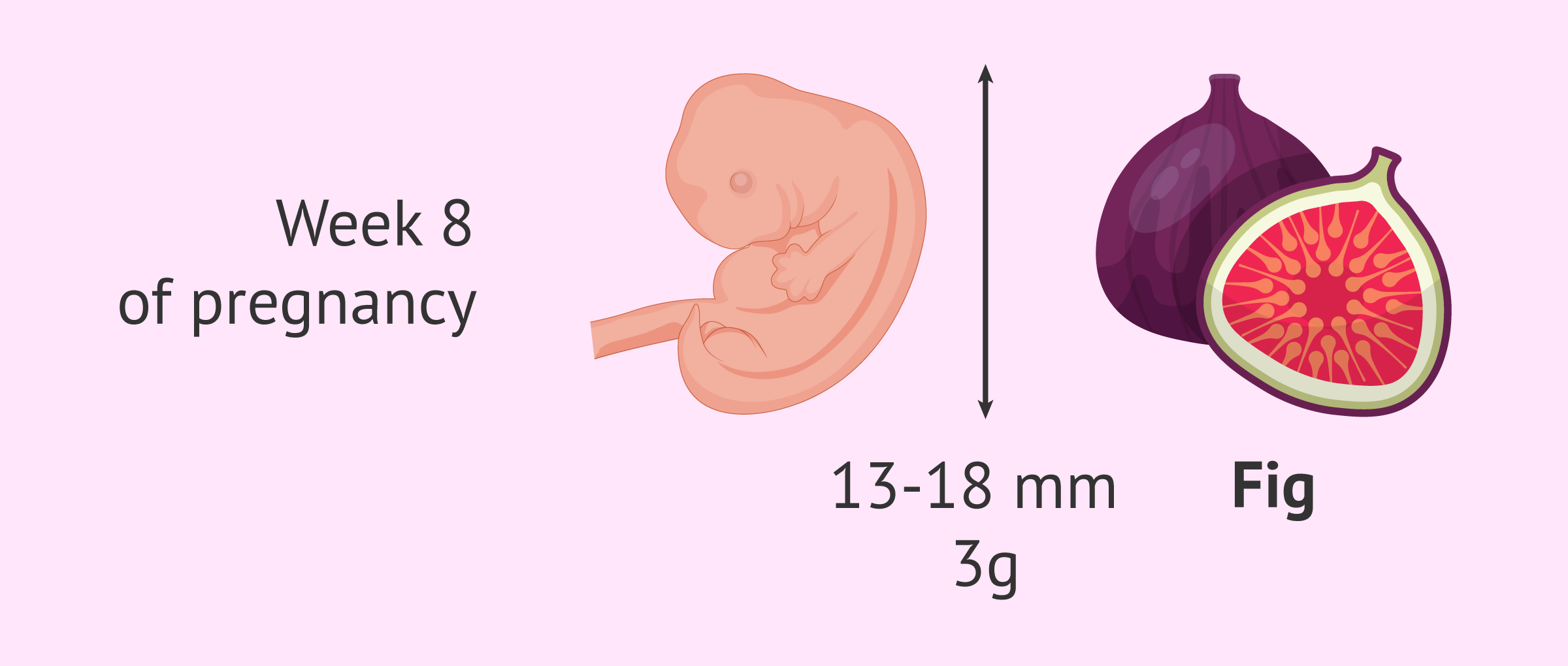
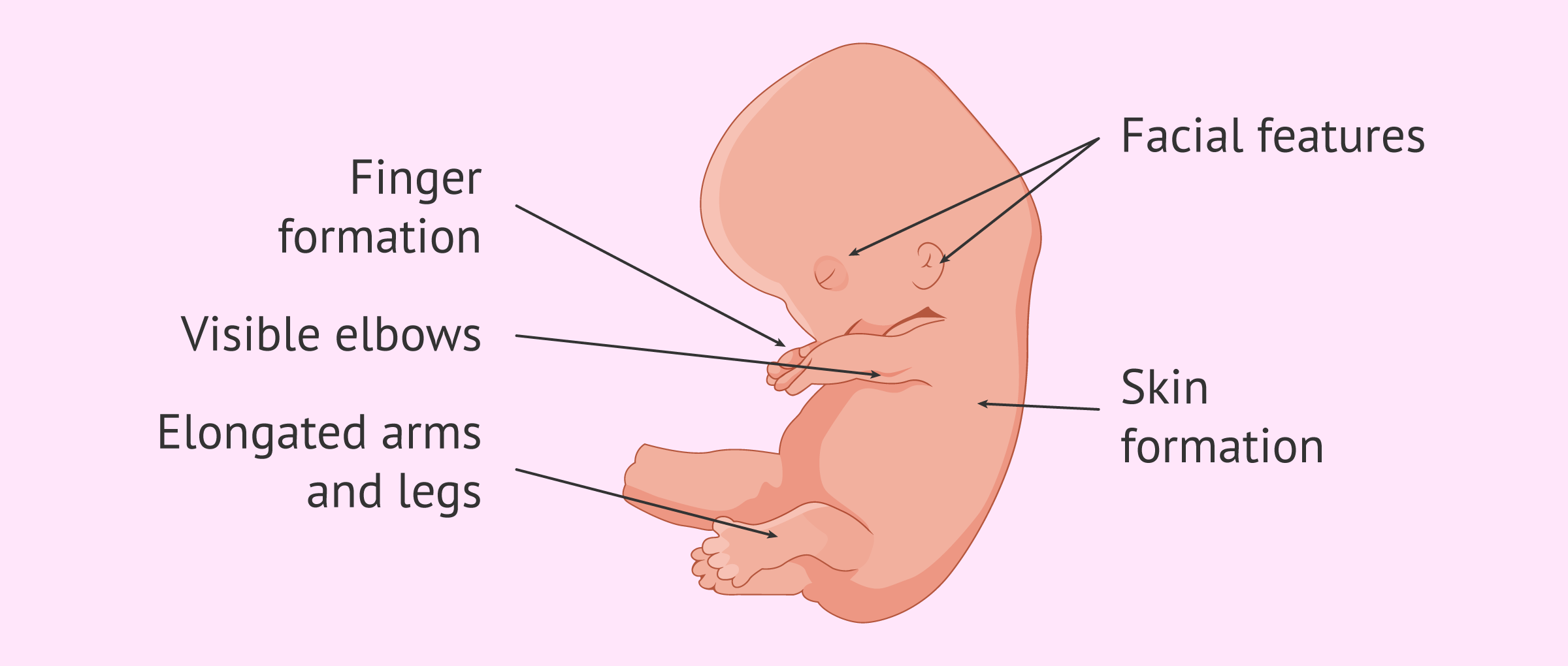
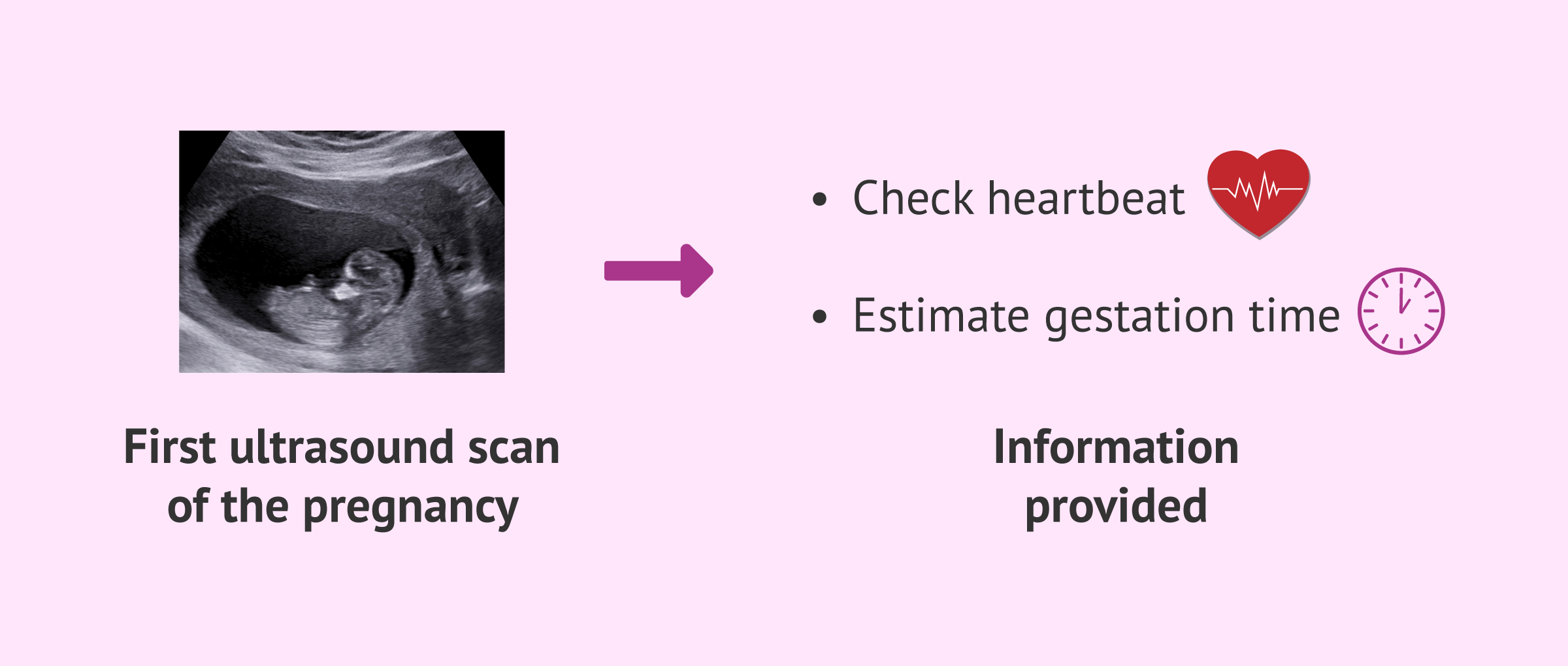
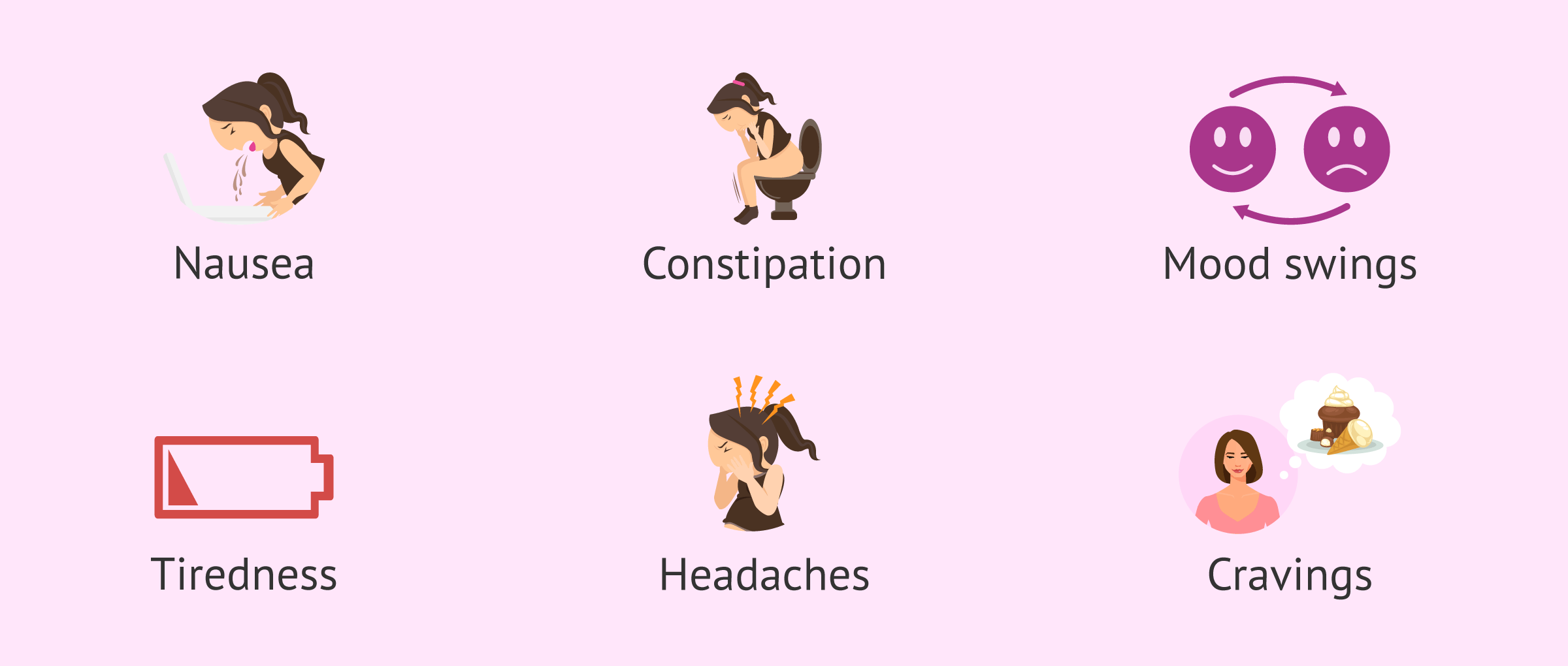
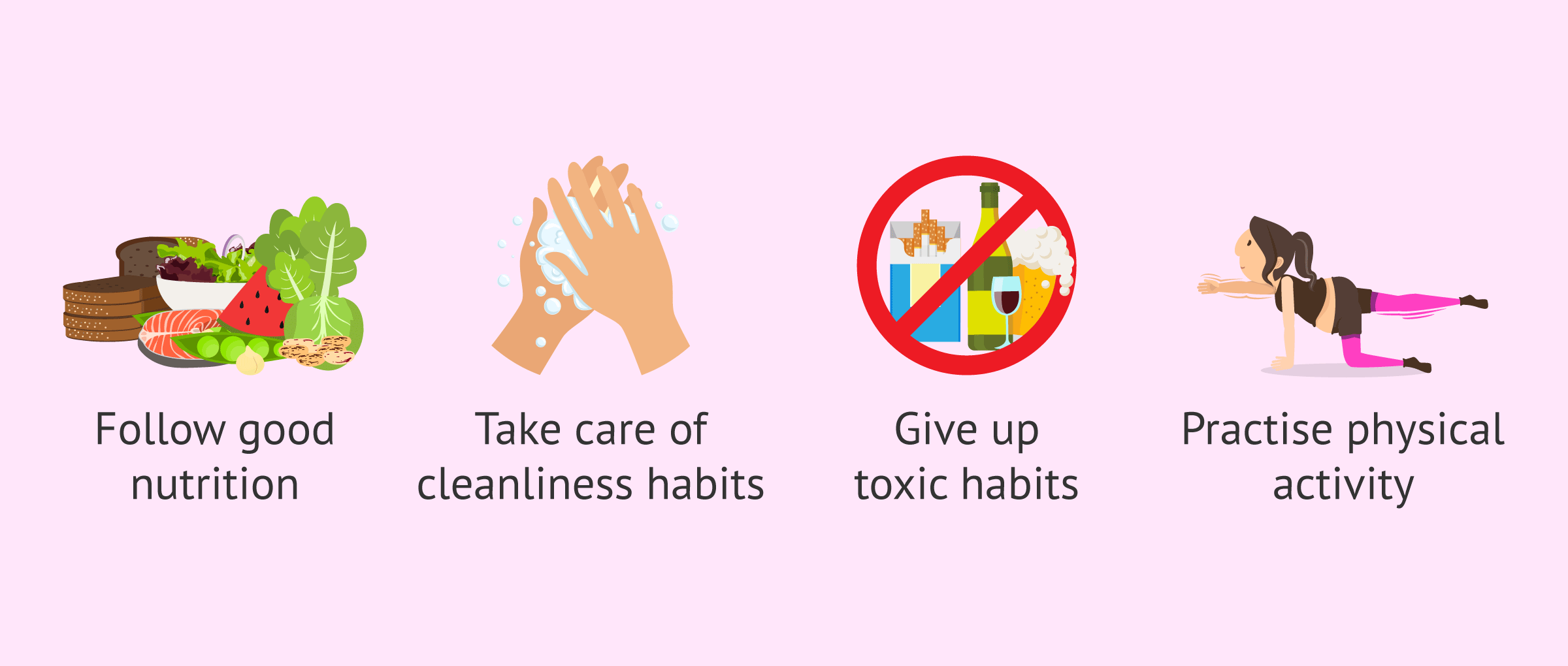



Hi, I’m 8 weeks pregnant and I can’t deal with nausea and vomiting, everything I eat I end up throwing up. I think I am dehydrated already. Is there anything I can do to stop feeling like this? Thank you
Hello Gayle__,
Nausea is a common symptom at this stage of pregnancy, it can be strong and prevent you from leading as close to normal life as possible.
To combat this nausea, it is recommended to eat smaller meals more times during the day, this way you can keep some food in your stomach but without it being full.
I recommend that you go to your doctor and discuss the problem. There are drugs suitable for this type of case that helps with nausea.
I hope I have helped you.
Best regards
Hi, I am very excited about the pregnancy. I would like to know when I will be able to feel the baby move! I am really looking forward to that moment!!!
Hello Noel,
Fetuses begin to move inside the mother from week 9 of pregnancy but the mother will not feel it until week 16 – 20, based on certain characteristics.
If the mother is a first-time mother, it will take longer to notice the movements, as well as if she is a large woman with a corpulent constitution.
On the other hand, women who have already been mothers or who have a slim constitution will feel the fetal movements earlier, around week 16.
I hope I have helped you,
Best regards.